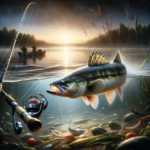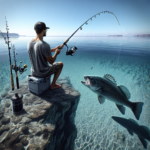Flounder Fishing Competition in New Jersey’s Coastal Waters
Introduction
Did you know that New Jersey’s coastal waters are home to some of the most competitive flounder fishing tournaments in the United States? Whether you’re a seasoned angler or a novice looking to dip your toes into the world of fishing, the flounder fishing competitions in New Jersey offer an exciting and rewarding experience.
This article will delve into the intricacies of flounder fishing competitions in New Jersey’s coastal waters. We’ll cover everything from the historical and cultural significance of these events to the best fishing techniques, species information, top fishing spots, and essential gear. Additionally, we’ll provide tips on safety, conservation, and planning your trip to ensure you have a successful and enjoyable fishing adventure.
Understanding the nuances of flounder fishing in New Jersey is crucial for anyone looking to participate in these competitions. Whether you’re aiming to find the best fishing spots, master specific techniques, or prepare for an upcoming event, this comprehensive guide has you covered.
Background/Context
Historical or Cultural Significance
Flounder fishing has deep roots in New Jersey’s coastal communities. Historically, flounder was a staple in the diet of local residents, and fishing for this species has been a popular pastime for generations. The cultural significance of flounder fishing is evident in the numerous local festivals and events dedicated to this activity, fostering a sense of community and tradition.
Geographical Overview
New Jersey’s coastal waters, including the Atlantic Ocean and various bays and estuaries, provide an ideal habitat for flounder. The region’s climate, characterized by mild winters and warm summers, supports a diverse marine ecosystem. The topography includes sandy bottoms, grassy flats, and rocky outcrops, all of which are prime environments for flounder.
Key Points/Details
Fishing Techniques
Technique Overview
Flounder fishing primarily involves bottom fishing techniques. Anglers use a variety of methods, including drift fishing, jigging, and using live bait. Drift fishing involves allowing the boat to move with the current while dragging bait along the bottom. Jigging requires a more active approach, with anglers using weighted lures to mimic the movement of prey. Live bait, such as minnows or squid, is also highly effective for attracting flounder.
When and Where to Use
Drift fishing is best suited for open waters with a steady current, such as the Atlantic Ocean. Jigging is effective in areas with structure, like reefs or wrecks, where flounder are likely to hide. Live bait can be used in various locations, including bays and estuaries, where flounder are abundant.
Recommended Gear
- Rods: Medium to heavy-action rods are ideal for flounder fishing.
- Reels: Spinning reels with a good drag system are recommended.
- Lines: Braided lines with a test strength of 20-30 pounds are suitable.
- Bait/Lures: Bucktail jigs, soft plastic lures, and live bait such as minnows or squid.
Species Information
Species Overview
Flounder, also known as fluke, are flatfish that inhabit the sandy and muddy bottoms of coastal waters. They are known for their distinctive appearance, with both eyes located on one side of their body. Flounder are ambush predators, lying in wait for prey to swim by before striking.
Best Practices
To successfully catch flounder, it’s essential to understand their behavior and habitat preferences. Flounder are most active during tidal changes, so plan your fishing trips around these times. Use a slow and steady retrieve when jigging to mimic the movement of prey. When using live bait, ensure it is fresh and lively to attract flounder effectively.
Location Information
Top Fishing Spots
- Barnegat Bay: Known for its abundant flounder population, with easy access points and amenities.
- Great Bay: Offers excellent fishing opportunities with a mix of sandy bottoms and grassy flats.
- Manasquan Inlet: A popular spot for both shore and boat fishing, with a variety of fish species available.
Regulations and Licenses
Anglers must adhere to local fishing regulations, which include size and bag limits for flounder. A valid New Jersey fishing license is required for anyone aged 16 and older. Be sure to check the latest regulations from the New Jersey Division of Fish and Wildlife before heading out.
Seasonal Considerations
Seasonal Variations
Flounder fishing conditions vary throughout the year. Spring and fall are the peak seasons, with flounder moving inshore to feed. Summer offers good fishing opportunities, but anglers may need to venture further offshore. Winter fishing is less productive, as flounder move to deeper waters.
Best Times to Fish
The optimal times for flounder fishing are during tidal changes, particularly the incoming tide. Early morning and late afternoon are also productive times, as flounder are more active during these periods.
Events and Tournaments
Event Overview
New Jersey hosts several flounder fishing tournaments throughout the year. Notable events include the “Jersey Shore Fluke Tournament” and the “Greater Atlantic City Flounder Tournament.” These events attract anglers from all over the region and offer cash prizes, trophies, and bragging rights.
Preparation Tips
To prepare for a flounder fishing tournament, practice your fishing techniques and familiarize yourself with the competition rules. Ensure your gear is in top condition and pack extra supplies, such as bait and tackle. Study the fishing spots and plan your strategy based on tidal patterns and weather conditions.
Tips and Best Practices
General Tips
- Always check the weather forecast before heading out.
- Use a fish finder to locate flounder hotspots.
- Keep your bait fresh and lively to attract more fish.
- Practice catch and release to support conservation efforts.
Avoid Common Mistakes
- Avoid using heavy tackle, as it can spook flounder.
- Don’t ignore tidal patterns; they significantly impact flounder activity.
- Ensure your bait is properly secured to avoid losing it to strong currents.
Advanced Techniques
- Experiment with different jigging patterns to find what works best.
- Use scented baits or attractants to increase your chances of a bite.
- Try night fishing during the summer months when flounder are more active.
Gear and Equipment Recommendations
Essential Gear
- Medium to heavy-action rod
- Spinning reel with a good drag system
- Braided line (20-30 pounds test)
- Bucktail jigs and soft plastic lures
- Live bait (minnows, squid)
Optional Gear/Upgrades
- Fish finder
- Portable GPS
- Scented baits or attractants
- High-quality tackle box
Where to Buy or Rent
Local bait and tackle shops in New Jersey, such as “Fisherman’s Headquarters” in Ship Bottom and “The Reel Seat” in Brielle, offer a wide range of fishing gear. Online stores like Bass Pro Shops and Cabela’s also provide extensive selections and convenient shipping options.
Safety and Conservation
Safety Tips
- Always wear a life jacket when fishing from a boat.
- Be aware of weather conditions and avoid fishing during storms.
- Stay hydrated and protect yourself from the sun with sunscreen and appropriate clothing.
- Keep a first aid kit on hand for emergencies.
Conservation Practices
- Practice catch and release to help maintain flounder populations.
- Respect local wildlife and avoid disturbing their habitats.
- Follow all fishing regulations and size limits.
- Dispose of fishing line and other waste properly to protect the environment.
Planning Your Trip
Accommodations
There are numerous accommodations near New Jersey’s top fishing spots. Options range from beachfront hotels and motels to cozy bed and breakfasts. Popular choices include “The Ocean Club Hotel” in Cape May and “The White Sands Resort” in Point Pleasant Beach.
Travel Tips
New Jersey’s coastal areas are easily accessible by car, with major highways such as the Garden State Parkway providing convenient routes. For those flying in, Atlantic City International Airport and Newark Liberty International Airport are the closest major airports. Renting a car is recommended for exploring different fishing spots.
Additional Activities
New Jersey’s coastal towns offer a variety of activities for non-fishing time. Enjoy the beautiful beaches, visit local attractions like the Cape May Lighthouse, or explore the vibrant boardwalks in towns like Wildwood and Seaside Heights. These activities make the trip enjoyable for families and groups.
Frequently Asked Questions (FAQs)
Do I need a fishing license to participate in flounder fishing competitions in New Jersey?
Yes, a valid New Jersey fishing license is required for anyone aged 16 and older.
What is the best time of year for flounder fishing in New Jersey?
Spring and fall are the peak seasons for flounder fishing, with optimal conditions during tidal changes.
What type of bait is most effective for catching flounder?
Live bait such as minnows and squid, as well as bucktail jigs and soft plastic lures, are highly effective for catching flounder.
Are there any size or bag limits for flounder in New Jersey?
Yes, there are size and bag limits for flounder in New Jersey. Be sure to check the latest regulations from the New Jersey Division of Fish and Wildlife.
What safety precautions should I take when flounder fishing?
Always wear a life jacket, check the weather forecast, stay hydrated, and keep a first aid kit on hand.
Conclusion
Flounder fishing competitions in New Jersey’s coastal waters offer an exciting and rewarding experience for anglers of all skill levels. By understanding the historical and cultural significance, mastering the best fishing techniques, and being well-prepared with the right gear and knowledge, you can enhance your chances of success. Remember to prioritize safety and conservation to ensure a sustainable and enjoyable fishing adventure. Whether you’re participating in a tournament or simply enjoying a day on the water, New Jersey’s coastal waters provide the perfect backdrop for an unforgettable flounder fishing experience.



